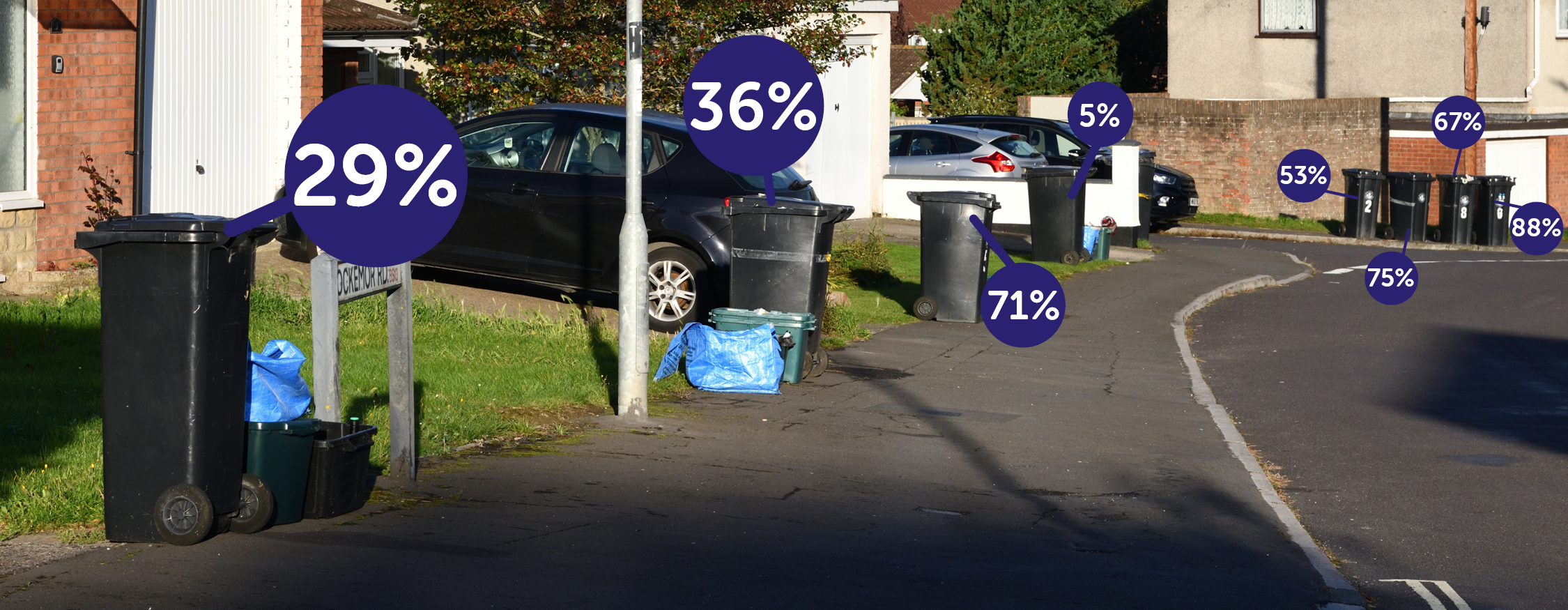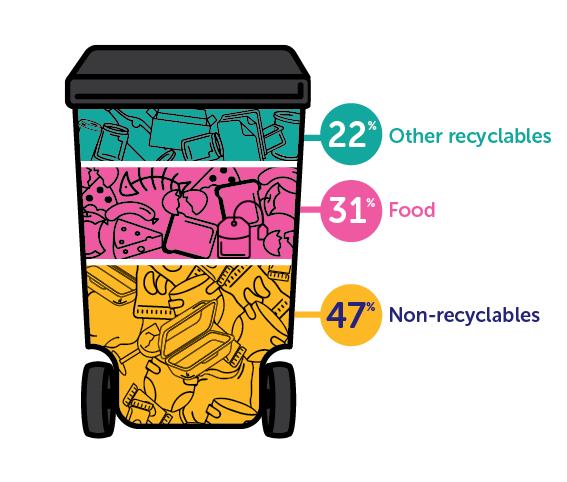Latest research: what percentage of Bristol’s wheelie bins could have been recycled?

What percentage of Bristol’s waste could have been recycled?
Latest research shows that Bristol is binning things incorrectly! The percentage of recyclable materials being thrown away in the average Bristol general waste wheelie bin (which should be for non-recyclable waste only) has increased from 44% to 53%.
When you put things in the wrong bin, it takes a toll on the environment and costs the city in unnecessary disposal costs.
…And how much is that costing the city in unnecessary disposal fees?
In 2024, Bristol spent more than £10 million disposing of household general waste. When you put recyclable materials into the general waste, you throw away valuable resources unnecessarily.
As much as £5 million could have been saved last year – enough to run the city’s libraries 5 times over.

We need to recycle more!
We want you to work with us to recycle more! Use your household recycling containers. Visit the reuse and recycling centres and make the most of local recycling schemes (such as via local businesses and supermarkets). For top tips on recycling tricky items locally, visit recyclenow.com.
When we throw away recycling as general waste, it’s bad news for our city and for the planet.
Why is general waste so bad?
- Environmental impact: putting materials like food waste, plastic, cans and glass out to be recycled means more things can be made from recycled materials, rather than producing brand new ones. This reduces carbon usage and helps the environment.
- Increased costs for disposal: general waste disposal costs our city millions of pounds each year, and with policy change on the horizon, this amount is only going to increase.
- Lost revenue for the city: recyclable materials in the right containers can be sold, generating revenue for the city and reducing demand on public funds. In 2024, the recycling Bristolians put into their recycling containers earned the city around £4.5 million, money which goes back into the city’s essential services and reduces pressure on public funds. If those materials had gone into the general waste, it would have cost more than £8 million in disposal fees.
- Future carbon penalties: planned environmental regulations will mean tougher financial penalties for disposing of general waste which will cost the city millions of pounds more unless Bristol improves its recycling rates.
Why is recycling the answer?
When you put things in the right recycling box, bag or bin it means valuable materials like plastic, metal, food waste, cardboard, paper (and even things like batteries and small electrical goods) can be recycled.
This means you’re reducing our environmental impact and earning the city money as recycling is sold to manufacturers. This generates revenue which goes back into providing the city’s essential services and reducing the pressure on public funds.
The value of recyclable materials fluctuates with market trends, seasonal demands and global legislation.
For example, in 2024 every tonne of recyclables rescued from the general waste and put into those recycling containers, made about £340 difference for the city. In 2024, Bristol Waste collected 64,698 tonnes of recycling from the city’s kerbsides earning the city £4.5 million in revenue. If this had been collected as general waste, it would have cost the city £8.3 million.
Blog continues below.
31% of the average wheelie bin is food waste, which could have been recycled
What percentage of Bristol’s waste could have been recycled? Analysis carried out at the end of 2024 shows that the percentage of recyclable food waste in the wrong bin has gone up from around 25% to 31%.
When you put it in the brown food waste bin, we take food waste (like peelings, leftovers and out-of-date food) to be recycled into biogas and soil improver. Biogas is a renewable energy source that powers thousands of local homes. The soil improver helps to grow crops.
However, when you chuck food waste in the black wheelie bin, it releases harmful methane as it rots. Plus, it costs the city huge amounts in disposal fees.
22% of the average wheelie bin is other recyclables
Bristol’s general waste bins have also seen an increase in the amount of “dry recyclables” being thrown away. Dry recyclables refers to easily recyclable items that aren’t food or garden waste. The amount of valuable resources like plastic, glass, card, paper and electricals in the wrong bin in Bristol has increased from 15% to 22%. Costing the city and the environment in the process.
Only 47% of the average wheelie bin was non-recyclable waste
Every black wheelie bin full of waste costs the city money, whereas recycling in the right container can be sold, generating revenue. This helps ease demand on public funds and supports other key services, all whilst protecting the environment. It seems like a simple thing to do, but the benefits of recycling are incredible. It’s such an easy win to put materials into the right recycling container.
What happens to Bristol’s recycling?
In our city, recycling that’s put in the correct container really does get recycled!
Our duty of care is to make sure that waste is disposed of responsibly and recycling is processed to become new products. We aim to keep resources within the UK. All our recycling is sent to factories based on the following factors: location, environmental credentials, demand, and price. This ensures we get the best results for our city and the planet.
Helpful links
Find out more of the top facts about recycling in Bristol we wish everyone knew here.
Need to know which material goes in which recycling container? Check our Get It Sorted page.
Want to share this research? See our press release here.
